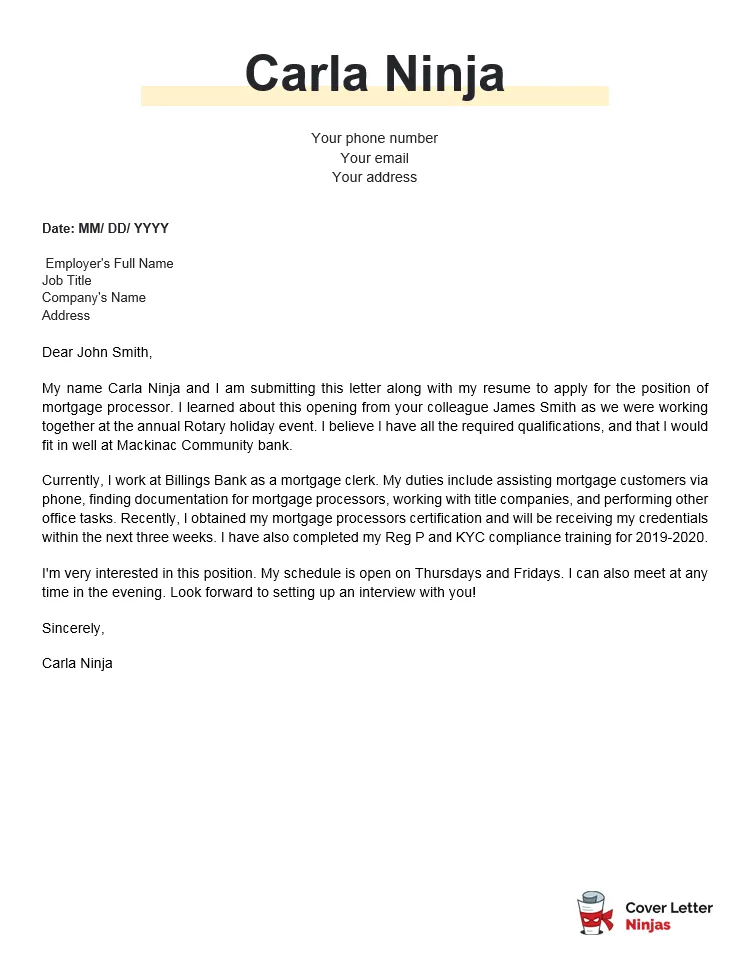Landing a bank job requires more than just a stellar resume. A well-crafted cover letter is your chance to make a strong first impression and demonstrate why you’re the perfect candidate. This guide provides a comprehensive example of a cover letter for a bank job and equips you with the knowledge to create one that stands out and gets you hired. By understanding the key components, tailoring your letter, and avoiding common pitfalls, you can significantly increase your chances of securing an interview and ultimately, your dream job in the banking sector.
Understanding the Bank Job Cover Letter Importance
The cover letter is your first opportunity to introduce yourself to a potential employer and showcase your personality, skills, and enthusiasm. Unlike a resume, which is a factual summary of your experience, a cover letter allows you to tell a story, connecting your qualifications to the specific requirements of the job. It’s a chance to elaborate on your resume entries, highlight relevant accomplishments, and explain why you are particularly interested in the role and the bank itself. A strong cover letter demonstrates your communication skills, attention to detail, and genuine interest in the position, setting you apart from other applicants. A well-written cover letter will quickly make your application stand out. Image bank-job-cover-letter.webp
Why a Cover Letter Matters for Bank Jobs
Bank jobs often involve high levels of responsibility, requiring trust, accuracy, and strong interpersonal skills. A cover letter allows you to demonstrate these qualities in a way that a resume alone cannot. It allows you to showcase your understanding of the banking industry, your knowledge of the specific role, and your commitment to providing excellent customer service. Banks look for candidates who are not just qualified but also possess the right attitude and the ability to fit in with the company culture. Your cover letter is where you can express these soft skills and articulate your passion for banking. It also offers the chance to clarify any gaps or unusual aspects of your resume, ensuring the hiring manager has a complete and positive picture of your candidacy. Image bank-job-application.webp
Highlighting Your Skills and Experience
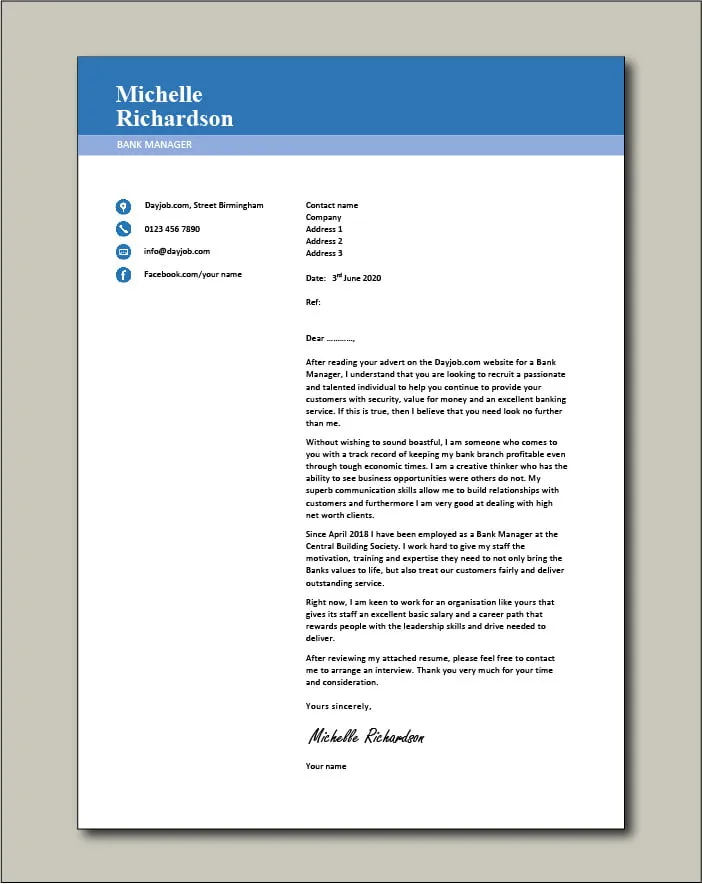
Your cover letter is the perfect platform to spotlight the skills and experience that align with the job requirements. It is essential to go beyond merely listing your qualifications. Instead, use concrete examples to illustrate how you’ve applied these skills in previous roles and the positive outcomes you achieved. For example, if the job description emphasizes customer service, share an instance where you successfully resolved a customer issue, highlighting your communication and problem-solving abilities. If the position involves financial analysis, describe a project where you demonstrated analytical skills and contributed to improved financial performance. Quantify your achievements whenever possible, such as increasing sales, reducing costs, or improving customer satisfaction. Image cover-letter-skills.webp
Key Components of a Bank Job Cover Letter
Header and Contact Information
Start your cover letter with a professional header that includes your full name, address, phone number, and email address. Also, include the date and the hiring manager’s name and title, if you know it, along with the bank’s address. This shows that you’ve taken the time to personalize your application, which is a crucial factor. If you cannot find the hiring manager’s name, use a general title, like “Hiring Manager.”
Personalized Salutation
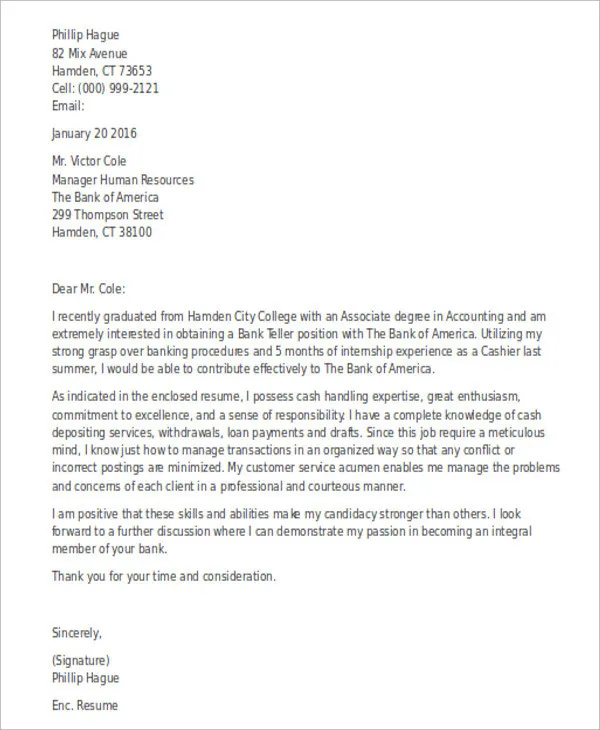
Address the hiring manager by name whenever possible. This shows you’ve done your research and are genuinely interested in the position. Use “Dear Mr./Ms./Mx. [Last Name],” or a similar formal greeting. Avoid generic salutations like “To Whom It May Concern,” as these can make your letter seem impersonal and less engaging. If you cannot find a specific name, using a professional title is the best option. It adds a level of personalization that can significantly improve your chances of getting noticed.
Opening Paragraph Grab Attention
The opening paragraph is your first chance to make a strong impression. Start with a compelling statement that captures the reader’s attention. You can mention how you learned about the job, express your enthusiasm for the position, or highlight a key skill or accomplishment relevant to the role. Avoid generic phrases like “I am writing to express my interest.” Instead, craft a sentence that immediately grabs the hiring manager’s interest and makes them want to read further. State the position you are applying for immediately. Image bank-job-interview.webp
Body Paragraphs Showcasing Skills
The body paragraphs are where you demonstrate your skills and experience, providing specific examples of how you have met the requirements outlined in the job description. Use the STAR method (Situation, Task, Action, Result) to describe your accomplishments. For example, describe the situation you faced, the task you were assigned, the actions you took to address the situation, and the positive results you achieved. Focus on skills such as customer service, financial analysis, attention to detail, and problem-solving, as these are highly valued in the banking industry. Quantify your achievements whenever possible.
Quantifiable Achievements
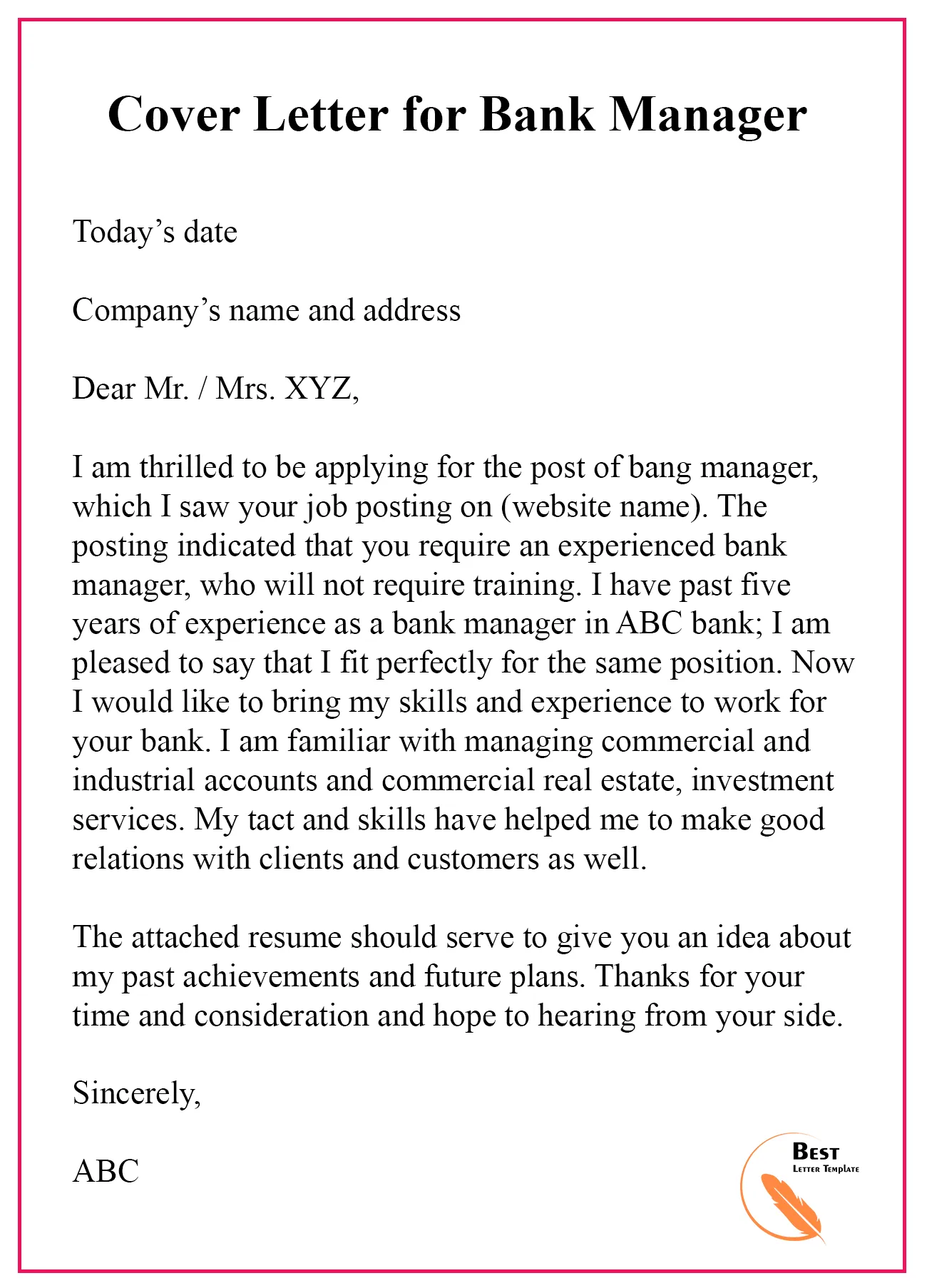
Use numbers and data to show the impact of your contributions. For example, “Increased sales by 15% in six months,” or “Reduced customer complaints by 20%.” Such specific details demonstrate your effectiveness and provide concrete evidence of your skills and experience.
Relevant Skills and Experience
Highlight the skills and experience that are most relevant to the specific job you’re applying for. Refer back to the job description and focus on the key requirements. If the job requires proficiency in a specific software, mention your experience and the level of your expertise. Similarly, if the role involves customer interaction, emphasize your communication and problem-solving skills.
Closing Paragraph Call to Action
Conclude your cover letter by reiterating your interest in the position and expressing your enthusiasm for the opportunity. Thank the hiring manager for their time and consideration. Include a call to action, such as expressing your availability for an interview and providing your contact information. End with a professional closing, such as “Sincerely,” or “Best regards,” followed by your name.
Proofreading and Formatting
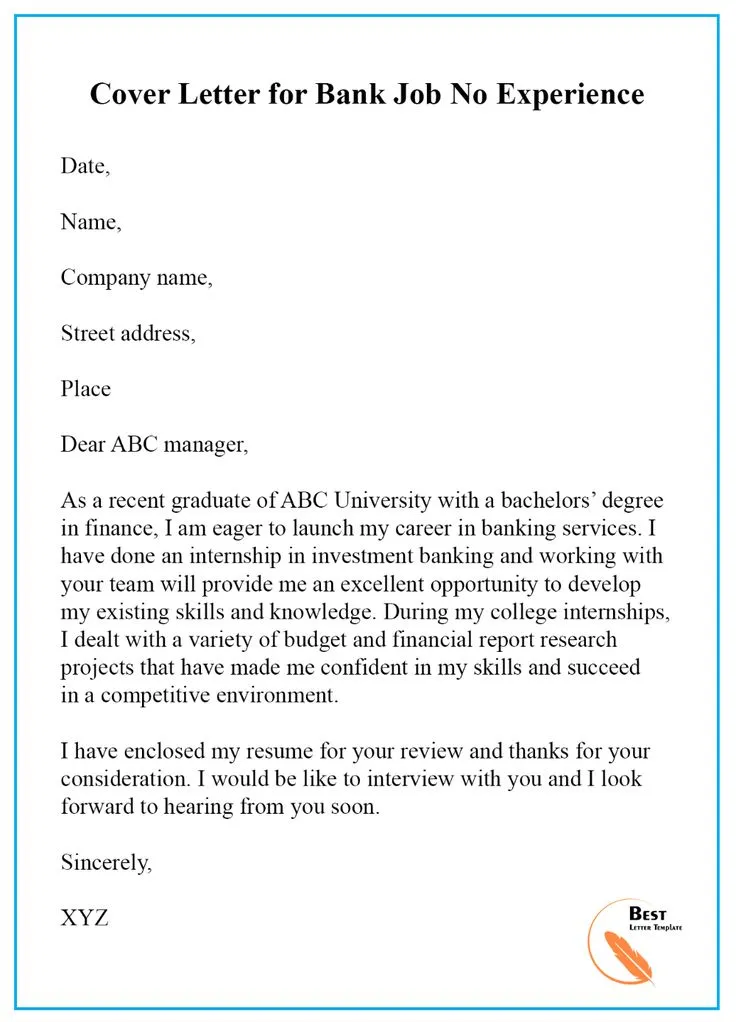
Before submitting your cover letter, carefully proofread it for any typos, grammatical errors, or formatting issues. A well-formatted and error-free cover letter demonstrates your attention to detail and professionalism. Use a clear and readable font, such as Times New Roman or Arial, with consistent formatting throughout the document. Check the alignment, spacing, and overall appearance to ensure it is easy to read and visually appealing. Ask a friend or family member to review your letter for a fresh perspective. Ensure your grammar is correct and that there are no spelling errors.
Tailoring Your Cover Letter for Specific Bank Jobs
Researching the Bank and the Role
Customize your cover letter for each job application. Research the bank and the specific role to understand their needs and expectations. Review the job description carefully and identify the key requirements and desired qualifications. Demonstrate your knowledge of the bank’s mission, values, and culture. Mentioning specific programs, initiatives, or recent news about the bank shows that you have done your homework and are genuinely interested in working there. This level of detail can help differentiate you from other applicants.
Using Keywords from the Job Description
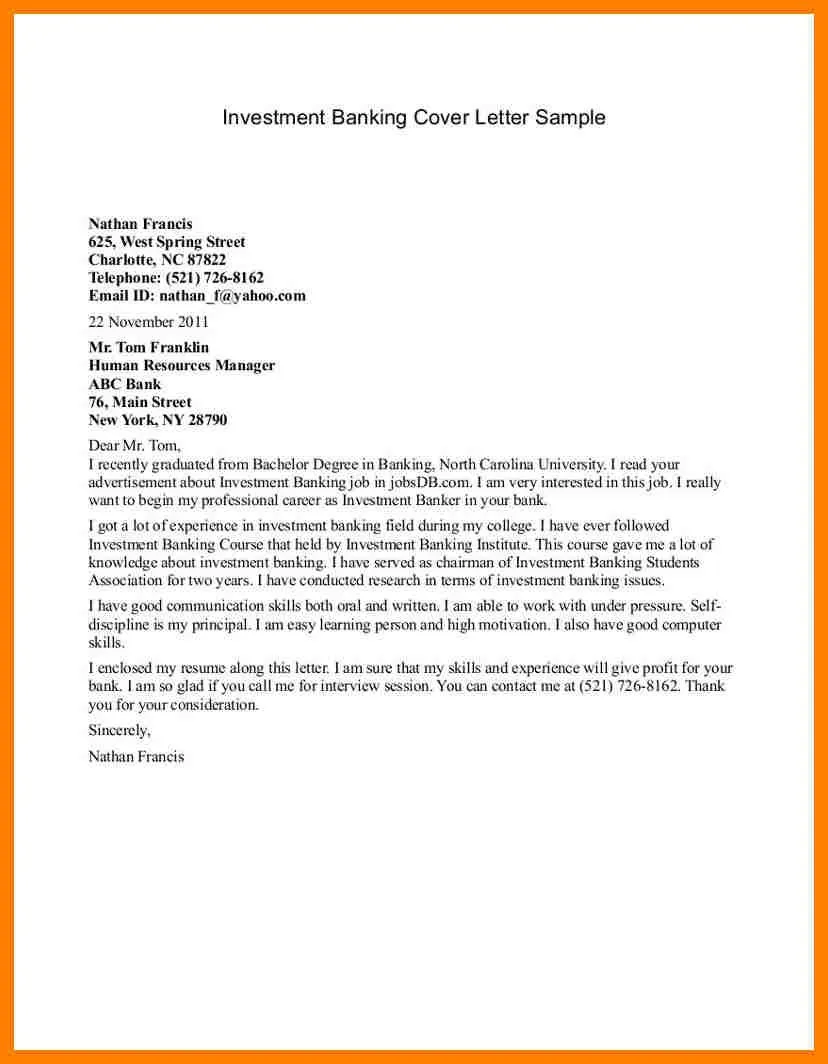
Incorporate keywords from the job description into your cover letter. This helps the hiring manager quickly identify that your qualifications match the role’s requirements. Carefully read the job description and identify the essential skills, experience, and qualifications the bank is looking for. Then, use these keywords throughout your cover letter to highlight how your experience aligns with those requirements. This strategic use of keywords can significantly increase the chances of your application getting past automated applicant tracking systems and into the hands of a human reviewer.
Demonstrating Your Enthusiasm
Show your enthusiasm for the position and the bank. Express your genuine interest in the role, and explain why you are a good fit for the company culture. Share why you’re excited about the opportunity, and how you see yourself contributing to the bank’s success. Show your passion for the banking industry and your eagerness to learn and grow within the organization. Highlight any specific aspects of the bank that appeal to you. These actions enhance your application and improve the possibility of securing an interview. Image bank-job-research.webp
Common Mistakes to Avoid
Generic Cover Letters
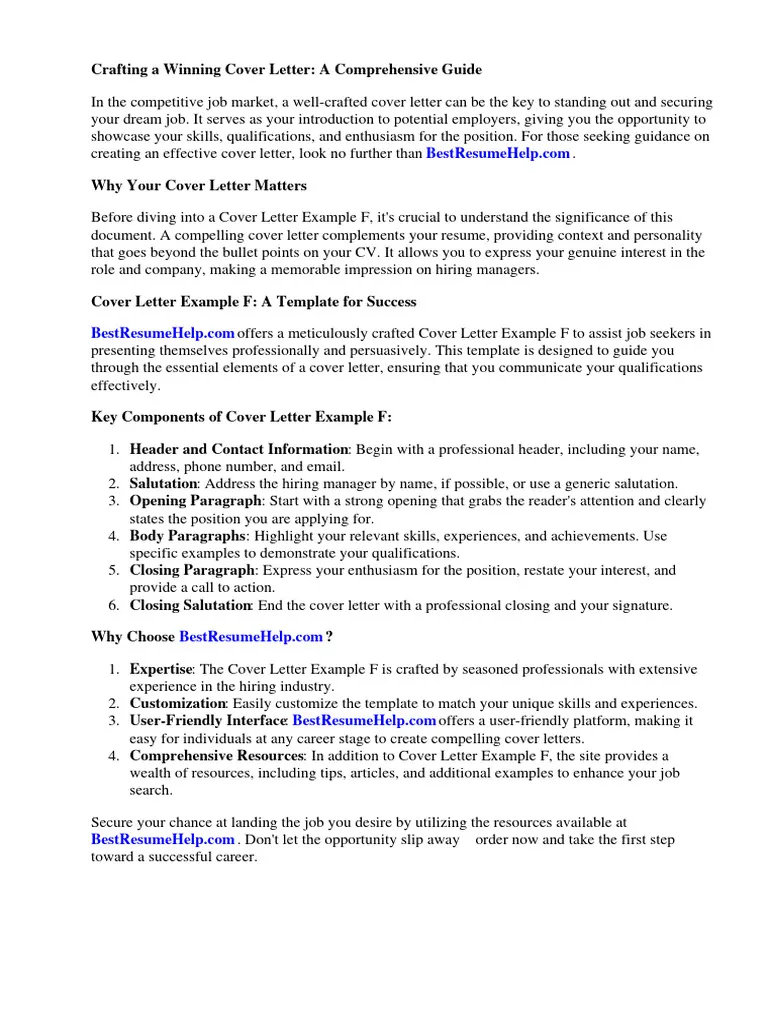
Avoid using a generic cover letter. Generic cover letters that are not tailored to the specific job and bank can make your application seem impersonal and less impressive. Customize your cover letter for each job application. Mention the specific position you are applying for and the bank’s name in the first paragraph. Highlight the specific skills and experiences that match the requirements of the job description. The applicant’s lack of attention to detail demonstrates a lack of interest. Image cover-letter-mistakes.webp
Typos and Grammatical Errors
Typos and grammatical errors can damage your credibility and make you look unprofessional. Carefully proofread your cover letter before submitting it, and use a spell checker to catch any errors. Ask a friend or family member to review your letter for a fresh perspective. Ensure that your writing is clear, concise, and easy to understand. Poor writing skills often indicate a lack of attention to detail. The impact can be detrimental, making it difficult for your application to be considered.
Lack of Enthusiasm
Show enthusiasm in your cover letter. Lack of enthusiasm can make you seem disinterested in the position and the bank. Express your genuine interest in the role and why you are a good fit for the company culture. Share how you see yourself contributing to the bank’s success. By clearly articulating your passion for the banking industry, you make it easier for hiring managers to consider your application seriously. These actions demonstrate to the employer your eagerness to learn and grow within the organization.
Following Up After Submitting Your Cover Letter
After submitting your cover letter, follow up with the hiring manager to express your continued interest in the position. Send a brief email or make a phone call a week or two after submitting your application. This demonstrates your initiative and commitment to the job. Reiterate your interest in the role and briefly mention your qualifications. Thank the hiring manager for their time and consideration. This small gesture can significantly improve your chances of securing an interview. Image cover-letter-success.webp
In conclusion, crafting a compelling cover letter is crucial for securing a bank job. By understanding the importance of a cover letter, following the key components, tailoring your letter, and avoiding common mistakes, you can significantly increase your chances of getting hired. Remember to highlight your skills, experience, and enthusiasm, and always proofread your letter before submitting it. Following these tips will help you create a winning cover letter that sets you apart from the competition and gets you closer to your dream job in banking.
